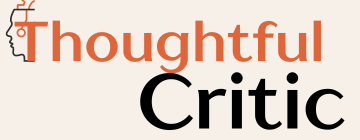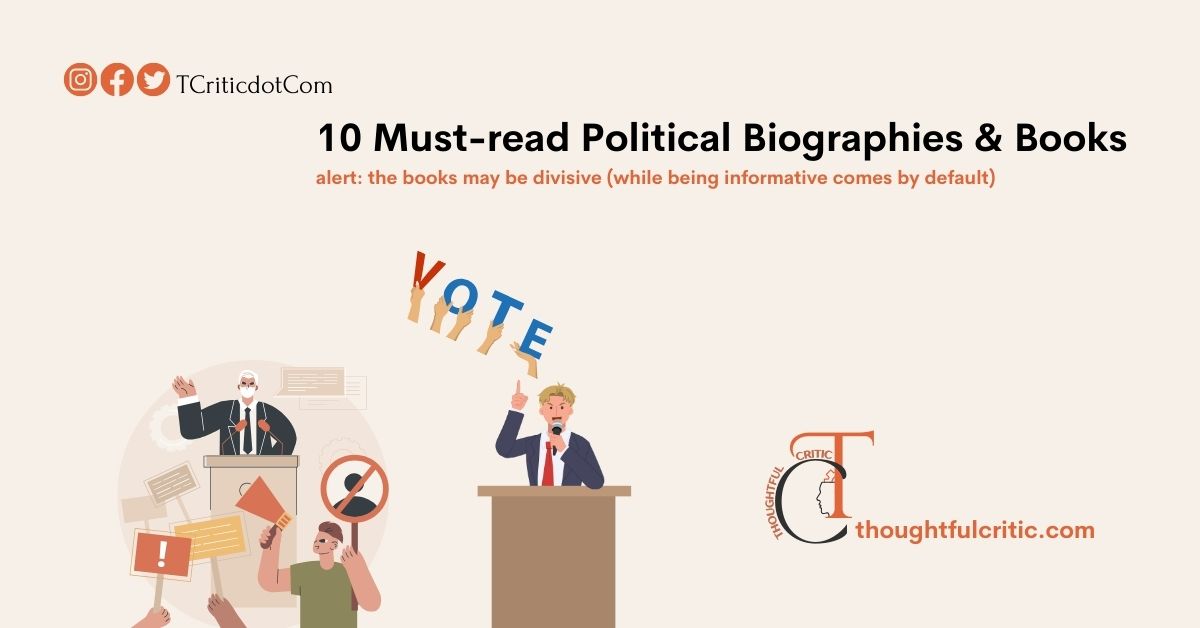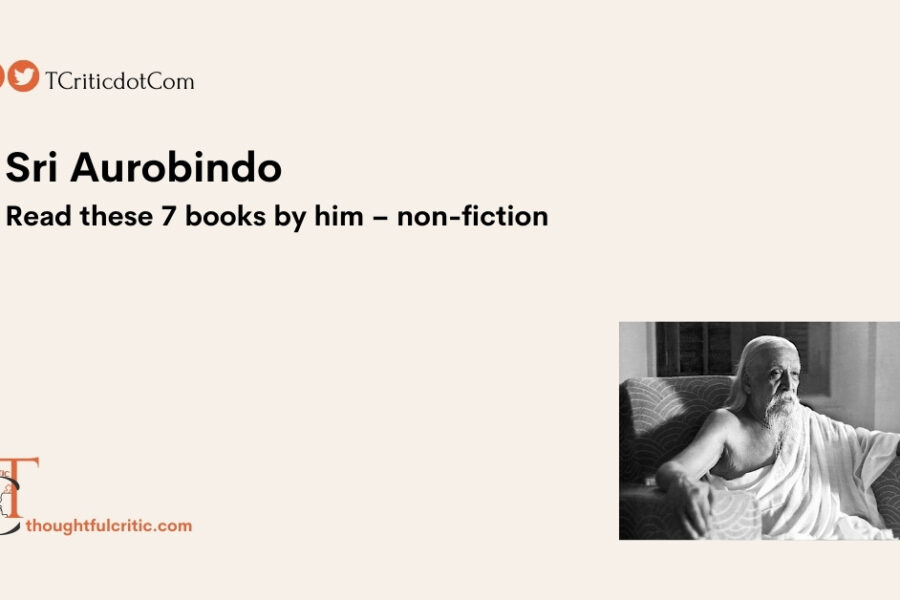Who doesn’t like discussing politics? If you may have asked this question 10-15 years ago, there might have been a few hands raised in agony. However, in today’s politically charged atmosphere, politics runs in the veins of people. Here, there, and everywhere – politics, political parties, leaders, events, rallies, decisions and much more – people are just ready. I am not sure if democracy truly became for the people and by the people, but politics, in general, has certainly reached that level! And that’s why I am bringing a list of controversial and general biographies and books, loaded with politics in different aspects, that you may enjoy reading if these subjects fascinate you. However, before we dive into the list of books and their descriptions, let us understand why reading political books may be good (or bad).
Well, it’s like riding two boats at the same time! In a world driven by constant change and diverse perspectives, delving into the realm of political biographies can be both a fascinating and polarising journey. These intimate accounts offer a unique glimpse into the lives of influential figures, providing invaluable insights into their motivations, decisions, and the impact they have had on society. However, they can also reveal uncomfortable truths that may challenge our preconceived notions and beliefs, leading to a potential love-hate relationship with the subject matter.
On one hand, reading political biographies can be immensely beneficial. They allow us to learn about the experiences and challenges faced by those who have shaped our world, fostering a deeper understanding of the complexities of politics and leadership. Biographies can also broaden our perspectives, encouraging empathy and critical thinking as we engage with different viewpoints and ideologies. At the same time, these personal narratives can be divisive. Uncovering unsettling truths about a person we once admired or discovering that our beliefs do not align with those of the author can lead to feelings of disappointment, frustration, and even anger. This emotional turmoil can create a love-hate dynamic, as we grapple with the conflicting emotions and opinions that arise from our reading.
Ultimately, engaging with political biographies is an enriching experience that can help us grow as individuals and members of society. By embracing the diverse perspectives and lessons these works offer, we can develop a more nuanced understanding of the world around us and the figures who have shaped it.
And so, if you are ready to take the risk, below are the books that I recommend… if you are interested in politics and political figures, these books will certainly add something to your knowledge. However, keep in mind that these books may be controversial in nature and you may find counters and facts challenging the assertions made in these books. All the best!
1. “The Autobiography” by John Major (1999):
John Major’s autobiography presents a candid and insightful account of his life and political career as the British Prime Minister. Providing a unique perspective on the challenges he faced during his tenure, Major offers a detailed look into his upbringing, early political career, and the significant events that shaped his time in office. Engaging and personal, Major’s writing style makes this book essential for those interested in British politics and history.
2. “The Last Politician” by Steve Inskeep (2023):
Steve Inskeep’s compelling biography explores the rise to power and the societal impact of a controversial politician. Delving into the background of the subject, Inskeep examines the factors that shaped their political ideology and ambitions. The book covers various controversies, scandals, successes, and failures, offering a balanced and nuanced approach that provides a fascinating look into the complexities of modern politics.
3. “Surrender” by Bono (2024):
Bono’s intimate and thought-provoking memoir delves into his personal journey and controversial activism in the political arena. “Surrender” explores the experiences that shaped Bono’s life and beliefs, from his childhood in Ireland to his rise to fame as a musician and activist. The book candidly discusses his work with political and humanitarian organizations, as well as the criticism he faced for his outspoken views, offering an engaging exploration of the intersection of art, politics, and personal growth.
4. “And There Was Light” by Jon Meacham (2024):
Jon Meacham’s powerful and controversial examination focuses on the life and legacy of Abraham Lincoln, exploring his political career, personal struggles, and the profound impact of his actions on American history. The biography delves into ongoing debates about Lincoln’s legacy, highlighting the ways in which his life and work continue to resonate in contemporary American politics. With insightful analysis and an engaging narrative, “And There Was Light” proves to be a must-read for enthusiasts of American history and politics.
5. “Donald Trump v. The United States” by Michael S. Schmidt (2023):
Michael S. Schmidt’s eye-opening and controversial account provides a detailed look into the tumultuous presidency of Donald Trump and its impact on American politics and society. Schmidt explores the inner workings of the Trump administration, delving into various controversies and scandals that marked the president’s time in office. The book also examines the broader implications of Trump’s presidency for American democracy and the rule of law, making it a thought-provoking and essential read for those interested in contemporary politics.
6. “A Promised Land” by Barack Obama (2020):
Barack Obama’s powerful and personal memoir offers a unique perspective on his time as the 44th President of the United States. “A Promised Land” shares the experiences that shaped Obama’s political career and his tenure in the White House. The book candidly discusses the challenges he faced as the first African American president, as well as the successes and failures of his administration. A compelling and intimate look into the life of one of the most influential political figures of our time.
7. “After the Fall” by Ben Rhodes (2021):
Ben Rhodes’ thought-provoking and controversial exploration delves into the rise and fall of global politics in the 21st century. The book examines major events and trends shaping global politics, including the rise of populism, the decline of democracy, and the impact of technology on society. Rhodes discusses the role of political leaders and citizens in these developments, offering a timely and important perspective on the state of global politics today.
8. “Leadership” by Henry Kissinger (2022):
Henry Kissinger’s fascinating and controversial examination explores the life and political career of one of the most influential figures in modern history. “Leadership” shares Kissinger’s insights on the qualities that make a great leader and the challenges leaders face in today’s complex world. Drawing on his own experiences in diplomacy and politics, as well as the lives of other influential figures, the author provides a thought-provoking and engaging look into the art of leadership.
9. “The Divider” by Peter Baker and Susan Glasser (2022):
Peter Baker and Susan Glasser’s controversial and insightful biography examines President George W. Bush’s impact on American politics. The book provides a detailed look into Bush’s life and political career, exploring the events that shaped his presidency and the ongoing influence of his policies on American politics. The authors delve into controversies surrounding the Bush administration, including the Iraq War and the response to Hurricane Katrina, making “The Divider” a compelling and thought-provoking read.
10. “Revenge” by Michael Cohen (2022):
In “Revenge,” Michael Cohen, the former personal attorney to Donald Trump, offers a behind-the-scenes account of his time in Trump’s inner circle and the aftermath of his decision to turn against the President. The book explores how Trump and his administration sought to weaponise the Department of Justice against his critics, including Cohen himself. With a mix of personal anecdotes and political analysis, Cohen paints a picture of an administration willing to use the power of the government to target its opponents. “Revenge” provides a unique perspective on the inner workings of the Trump White House and the consequences faced by those who dared to speak out against it.
Conclusion:
In the grand tapestry of political biographies, each volume stands as a testament to the intricate dance between leadership and legacy. From the candid introspection of John Major’s “The Autobiography” to the controversial exploration of global politics in Ben Rhodes’ “After the Fall,” these literary odysseys offer readers a glimpse into the complexities of power, ideology, and the human condition. As we navigate the annals of political history through these pages, we find ourselves not just observers but participants in the ongoing dialogue of governance and consequence.
In the hallowed halls of leadership, the echoes of past decisions reverberate, shaping the trajectory of nations and the collective consciousness. The allure of these biographies lies not merely in the recounting of events but in the profound lessons they impart. Whether scrutinising the divisive reign of George W. Bush in “The Divider” or delving into the inner workings of the Trump administration in “Donald Trump v. The United States,” readers are confronted with the enduring question of how leadership, for better or worse, leaves an indelible mark on the pages of history.
As we traverse the corridors of power with Henry Kissinger’s contemplative “Leadership,” we glean insights into the elusive qualities that define greatness in leadership. Kissinger, drawing upon his vast diplomatic experiences, serves as a sage guide, urging readers to ponder not just the actions of leaders but the essence of leadership itself.
In this literary voyage, we find ourselves at the intersection of art and politics with Bono’s “Surrender,” where personal growth intertwines with activism, transcending the conventional boundaries of influence. Bono’s memoir beckons us to reflect on the symbiotic relationship between creativity and civic responsibility, challenging us to envision a world where the realms of music and politics converge for the greater good.
In the aftermath of political upheavals, Michael Cohen’s “Revenge” provides a riveting exposé, laying bare the inner workings of the Trump White House. Cohen’s narrative serves as a cautionary tale, prompting us to scrutinise the nexus between power and retribution, highlighting the fragility of democratic institutions when subjected to personal vendettas.
As we conclude this literary sojourn, each biography emerges as a time capsule, encapsulating the ethos of its era. These volumes are not mere reflections but active participants in the ongoing narrative of political evolution. In the quiet spaces between the lines, readers are beckoned to discern not just the stories of leaders but the underlying rhythms that shape the very fabric of societies. And with a note of hope that you will like all or at least a few books on the list, I am signing off until next time! All the best!
Buy these books on Amazon India – click here for the best-discounted rates
Amit for Thoughtful Critic


